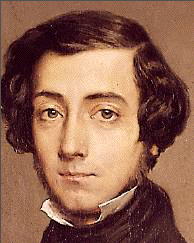In chapter 3 of Brendan Simms’ book on Hitler we can read:
Hitler now moved to reorganize and expand the NSDAP. By the end of 1921, membership stood at about 6,000. The party moved from Sterneckerbräu to larger premises at Corneliusstrasse 12. Local groups were founded in Hanover, Zwickau and Dortmund. Hitler tightened his control over the party, including the cells outside Germany. In the spring of 1922 the Austrian and Bohemian NSDAP accepted Hitler’s authority. Collegial decision-making was abolished…
Ideological purity rather than control for its own sake seems to have been his main concern.
The day before yesterday I mentioned a recent article by Matt Parrott just to quote a few comments from its comments section, but I omitted the subject of the article: the recent demise of a racialist party in his country that had barely been formed.
Early critics of the United States told great truths about that country: truths that now seem much harder to see. Alexis de Tocqueville in his famous book wrote that freedom of speech did exist in the newly formed nation across the Atlantic, as long as opinion was confined to the paradigm accepted by most Americans.
Born on July 29, 1805, into a family of royalists that lost several of its members during the period known as The Terror of the French Revolution, the fall of Robespierre in 1794 spared Alexis’s parents from the guillotine. For that reason, he was suspicious of the revolutionaries all his life, and let’s remember that the ideologies that led to the founding of the US and modern France were twinned.
 Alexis accepted a government mission to travel to the United States to study its prison system; his stay there lasted nine months. The fruit of this trip was a work on American prisons but his stay served him to deepen his analysis of the American political and social systems, which he described in his work Democracy in America (1835-1840).
Alexis accepted a government mission to travel to the United States to study its prison system; his stay there lasted nine months. The fruit of this trip was a work on American prisons but his stay served him to deepen his analysis of the American political and social systems, which he described in his work Democracy in America (1835-1840).
Let us now think about the above quote from Simms’ book on the party that Hitler founded and Parrott’s piece. It is curious how the Old World without a First Amendment to the US Constitution, written in such clear prose, was de facto more tolerant than what is now happening in the New World. Someone might retort to me that Europe is currently more intolerant about us than the US, and it is true. But we should not forget the free speech gag laws that the Allies imposed in Germany and Austria after WWII.
Only when the dollar collapses and the US government has to withdraw the huge number of military bases it has around the world, including those still existing in Germany, will it be possible to see again the Teutonic character unmolested by the country Alexis visited.